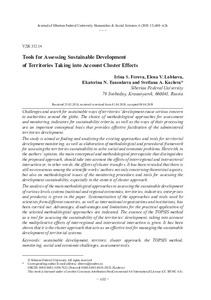Tools for Assessing Sustainable Development of Territories Taking into Account Cluster Effects
Скачать файл:
URI (для ссылок/цитирований):
https://elib.sfu-kras.ru/handle/2311/110100Автор:
Ferova, Irina S.
Lobkova, Elena V..
Tanenkova, Ekaterina N
Kozlova, Svetlana A.
Ферова, И. С.
Лобкова, Е. В.
Таненкова, Е. Н.
Козлова, С. А.
Дата:
2019-04Журнал:
Журнал Сибирского федерального университета. Гуманитарные науки. Journal of Siberian Federal University. Humanities & Social Sciences;2019 12 (4)Аннотация:
Challenges and search for sustainable ways of territories’ development cause serious concern to authorities around the globe. The choice of methodological approaches for assessment and monitoring, indicators for sustainability criteria, as well as the ways of their processing are an important conceptual basis that provides effective facilitation of the administered territories development.
The study is aimed at finding and analyzing the existing approaches and tools for territorial development monitoring, as well as elaboration of methodological and procedural framework for assessing the territories sustainability to solve social and economic problems. Herewith, in the authors’ opinion, the main conceptual and methodological prerequisite that distinguishes the proposed approach, should take into account the effects of interregional and intersectoral interaction or, in other words, the effects of cluster transfers. It has been revealed that there is still no consensus among the scientific works’ authors not only concerning theoretical aspects, but also on methodological issues of the monitoring procedure and tools for assessing the development sustainability, especially in the context of cluster approach.
The analysis of the main methodological approaches to assessing the sustainable development of various levels systems (national and regional economies, territories, industries, enterprises and products) is given in the paper. Systematization of the approaches and tools used by scientists from different countries, as well as international organizations and institutions, has been carried out. Advantages, disadvantages and limitations for the practical application of the selected methodological approaches are indicated. The essence of the TOPSIS method as a tool for assessing the sustainability of the territories’ development, taking into account the multiplicative effects of interregional and intersectoral interaction is given. It has been shown that it is the cluster approach that acts as an effective tool for managing the sustainable development of territorial systems Проблемы и поиски путей устойчивого развития территорий вызывают серьезную
обеспокоенность органов власти во всем мире. Выбор методических подходов для
оценки и мониторинга, показателей в качестве критериев устойчивости и способов
их обработки является важной концептуальной основой, которая помогает эффективно содействовать развитию управляемых территорий.
Данное исследование направлено на поиск и анализ существующих подходов и инструментов мониторинга территориального развития, разработку собственной
методологической и методической основы оценки устойчивости территорий в целях решения социально-экономических
проблем. При этом основной концептуально-методологической
предпосылкой, отличающей предлагаемый подход, на наш взгляд,
должен стать учет эффектов межрегионального, межотраслевого взаимодействия,
или, по-другому, эффектов кластерных переливов. Выявлено, что среди авторов по-прежнему отсутствует консенсус не только по теоретическим аспектам, но и по методологическим вопросам процедуры мониторинга и инструментам оценки устойчивости развития, особенно в контексте кластерного подхода.
В статье представлен анализ основных методологических подходов к оценке
устойчивого развития систем различного уровня (национальной и региональной
экономики, территорий, отраслей, предприятий, продуктов). Проведена систематизация подходов и инструментов, используемых учеными разных стран, международными организациями и институтами. Указаны преимущества, недостатки
и ограничения практического применения выделенных методологических подходов.
Изложена суть метода TOPSIS как инструмента оценки устойчивости развития территорий с учетом мультипликативных эффектов от межрегионального
и межотраслевого
взаимодействия. Показано, что именно кластерный подход является эффективным инструментом управления устойчивым развитием территориальных систем

